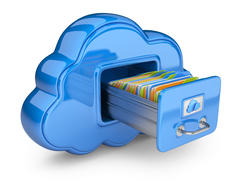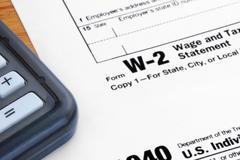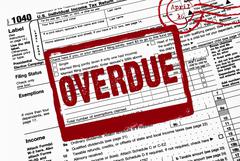
Labor Day signifies the end of summer and comes with a three-day weekend; maybe a trip to the beach, the lake, or the the cabin, and a barbecue.
Labor Day became a federal holiday in 1894, but it was first celebrated as a holiday in the United States on February 21, 1887. Of course, Labor Day is dedicated to the social and economic achievements of workers, but who wants to think about work on a federal holiday?
This Labor Day might be a good time to think about how you can use your travel as a tax deduction to offset some of the expense.
Read More

Whether you just spent the entire summer paying for child care and are happy to know that you now have a safe place to drop off your children Monday through Friday or you are wondering where your kids are going to be between the end of the school day and the end of your work day, child care is something that parents are all thinking about and trying to find solutions for at this time of year. In either case you need to know that your child care expenses are often tax deductible, however there are rules to consider, preparations to be made, and documents to save.
Read More

It’s that time of year; students are headed back to school and we are once again reminded that another year of the educational timeline has begun.
For parents, it only gets more expensive as the years tick by and approach the most expensive time of our educational years; college. As in many other aspects of our lives, the best way to confront this challenge is by being prepared.
Read More

The end of summer is in sight and for the younger members of the population, that means coming to grip with the end of worry free summer days. As the school buses take to the streets, the back to school sales heat up and the weather begins to cool down, you might want to take this opportunity to evaluate where your finances stand.
The end of summer doesn’t just mean it’s time to start packing lunches - it’s a good time to re-evaluate your finances and prepare for the new season, and maybe even get a head start on the new year.
Read More

One of the big benefits to getting organized and going digital is you can get rid of all that clutter that not only bogs down your desktop, but also discourages you from being organized.
Scan and file documents that you consider important. This way you can keep the original in a safe place while still having a digital copy available to you when you need it.
Read More

Scan it.
A valuable tool for the average taxpayer to the small business owner that can be surprisingly simple to integrate into your life is scanner. From simple scanners built into your office printer to dedicated document scanners for documents, receipts and business cards, there are a lot of options out there in a variety of price ranges.
Read More

Choose a secure online storage system. There are a lot of choices from Google Drive to Dropbox to Apple iCloud, but they all basically perform the same function and for personal users they are generally free. When you take a look at these services think about which one suits your needs in terms of ease of use, accessibility and your lifestyle.
Read More

Keeping financial documents organized and archived can be a chore. However, when staying organized becomes a routine and you provide yourself with the proper tools, staying organized can be easier than you think. On top of that, keeping your financial documents in order can really pay off. This month we are going to share with you some ideas, techniques and tools that will help you get organized and, with a little work, stay that way.
Read More

Are you self-employed and still want an employee matching retirement contribution plan? Well, you can with a SIMPLE IRA.
SIMPLE IRA
SIMPLE IRA stands for "Savings Incentive Match Plans for Employees." It’s a kind of retirement plan tailored for small businesses and they are designed to promote small business employers to offer retirement coverage to their employees. Additionally, they can be used for self-employed people even if they don’t have employees.
Read More

Being a sole proprietor has its tax advantages. Find out how you can benefit.
Read More

Buying a home can be a complex issue in itself and that’s on top of just being able to afford it. Here are some tips to bring it closer to reality.
Think on a small scale.
A small home or even a loft or condo in an area where demand is high will help build equity quickly as this type of place usually increases in value.
Read More

If you realize you made a mistake on your taxes you already filed. Don’t worry, here’s what you need to do.
If you filed your taxes by the deadline only to now find a mistake, you don’t need to worry. Usually, all you have to do is file an amended tax return (Amended U.S. Individual Income Tax Return). There are some things you should be aware of prior to filing the amended return however.
Read More

So your friend was in a pinch and you thought they’d be good for it and they weren’t. It’s not all bad; you can lower your taxable income as a result.
Maybe you loaned money to a friend to help with a struggling situation. But now it’s beginning to look like you are never getting paid back.
The IRS is there to help you take the sting out of never seeing that money again. As long as the debt has zero value, you may qualify for a deduction up to $3000.
Read More

Grandparents can help with college and lower taxable income.
A grandparent helping their grandchild pay for college can be a win all around. When a grandparent that contributes to a 529 savings plan, it lowers assets within the grandparent’s estate. This helps lowering estate tax.
Another great thing about a grandparent who owns a 529 college savings plan is that the account isn’t taken into consideration when the grandchild is applying for financial aid.
Read More

Reverse Mortgages are usually marketed in an appealing way. This could lead to someone asking how is it possible to pay a mortgage in reverse?
A reverse mortgage (also known as HECM, Home Equity Conversion Mortgage) works much like a regular mortgage but instead of you making a payment each month to the lender, the lender sends you a payment.
This type of mortgage is available to homeowners who are the age of retirement and older. Essentially, the mortgage holder gets cash installments sent to them based on the equity in their home.
Read More

Taxes get more complicated for most businesses than they do for individual taxpayers. And not knowing the laws applicable to you is not a justified reason to not comply. Here’s a guide to debunking common myths about business and taxes.
Read More

Make the most out giving to charity by benefiting from all the available tax breaks you’re entitled to.
Maintaining diligent records is the cornerstone to being eligible for the entire charitable contribution deduction the law entitles you to. This comprises of making sure the IRS has collected the mandatory statements for two donation categories—each donation of a minimum of $250 as well as gifts of vehicles. Tax filers intending to claim charitable contributions should ensure they’ve obtained all records required before filing their taxes.
Read More

Tax planning is the practice of analyzing multiple tax options to decide how you want to operate your business as well as your individual transactions to minimize or wipe out your tax liability.
Read More

See if your moving expenses qualify for a deduction.
If you moved as a result of a job change or to start a new business, your expenses are more than likely eligible for a tax deduction.
Read More

Forgot or put off your tax return? Here’s what you need to know.
It’s going to be ok. Or at least if you take care of it now, it’s going to be better than it will be if you keep avoiding filing your return.
Read More

Learn how your personal vacation can be turned into a legal deduction.
If you own your own business and decide you want to take a two-week road trip across America, you can legally deduct almost every cent you spend on your vacation. Here's how you do it.
1. Set up business appointments prior to your trip.
Many folks think they can go on vacation and just dole out business cards and then the trip is considered deductible. However, they are wrong.
Read More

Automatic reinvestment is a great strategy but is still subjected to being taxed.
Many mutual funds give you the choice of automatically reinvesting dividends and capital gain allocations back into the fund. This is an excellent option to acquire new shares and build your investments.
Read More

With a working knowledge of how mutual funds are taxed along with some diligent bookkeeping, you can reduce the amount your mutual investments are taxed on. The below gives you the understanding you need of mutual fund taxation.
Read More

The IRS requires you to meet specific obligations when hiring a new employee. Here’s a list of what you need to know to do
Proof of Citizenship
You need to confirm that every new hire is allowed to work in the US. To confirm this, you and the employee will need to complete the U.S. Citizenship and Immigration Services (USCIS) Form I-9, Employment Eligibility Verification. An I-9 form is available at USCIS offices or you can call 1-800-870-3676.
Read More

Employers are required to give you your W-2 by January 31st. Here’s what to do if you don’t have it.
You should follow the four steps below if you’ve not received your W-2 from your employer.
Read More

If you’re taking a vacation, you can rent your house out while you’re away. You can make money and have a housesitter all tax free.
The IRS allows you to rent your home up to 2 weeks without having to pay income taxes. This can be an ideal scenario if you’re concerned about leaving your house empty for 2 weeks. You can use an online service like AirBnB to find qualified people to rent your house.
Read More

What's type of loan is ideal for big ticket items?
An equity loan is best for those who own their home. Interest paid that comes from credit card debt and auto loans are not eligible for reducing your taxable income. However, you can use the interest from an equity loan on your home to reduce your taxable income. So if you want to buy a car, you could take an equity loan out on your home and buy a car.
Read More

Great tax management is keeping and receiving all the money you’re entitled to while meeting your legal obligations. Here are some common mistakes you don’t want to make.
Read More

The best way to plan for taxes is to start at the beginning of the tax year. So it’s important to know how the tax laws change so you can plan to take every advantage to keep as much of your income as you’re entitled to.
What’s New for Business Owners
Read More

If you have neglected to file past taxes, you’ll be surprised it isn’t as stressful as it you might think.
However, the longer you wait to deal with paying your taxes and filing a claim, it just gets more expensive. It’s best to take care of it now. You’ll be so happy you did!
Even if you know you can’t pay all you owe, it’s best to make sure you file on time as you may qualify for a payment plan. However, paying by the due date is the way to go about paying the least.
Read More